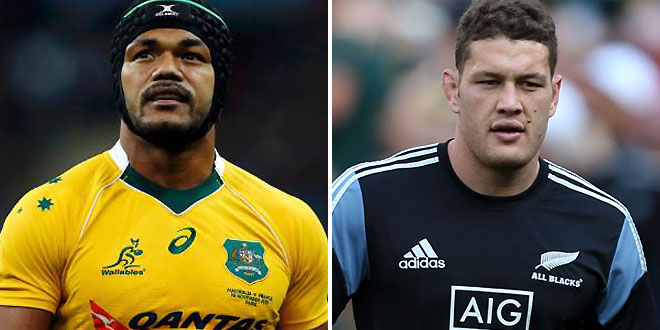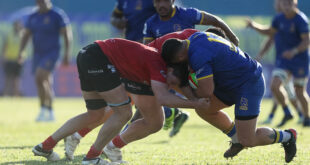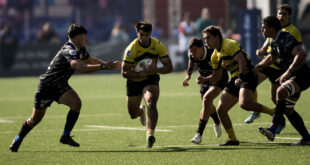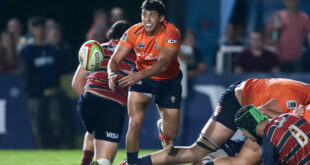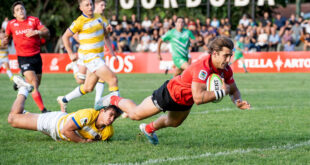Following the popularity of Americas Rugby News’ Foreign-Born Players at Rugby World Cup 2015, the hot topic of debate regarding player eligibility is to be looked at again. In this piece Americas Rugby News takes an in-depth look into the foreign-born players in each Rugby Championship roster. Included will be where they were born and how they came to be eligible.
World Rugby has been under fire to take action to alter eligibility laws. In response to Nathan Hughes playing for England Vice Chairman, Agustín Pichot slammed his organizations policy. The Fijian playing fro England was ultimately the straw that broke the camels back. World Rugby acted by voting to extend residency laws from three years to five.
The amendment of the three-year residency rule will impact many countries, both established powers and lower Tier countries. For the Rugby Championship Australia is to be the primary country influenced. The initial 38-man squad featured 21 players born abroad. Many of them qualify via the three-year rule and would not yet qualify under five.
American Samoa, Australia, Fiji, Ghana, Namibia, New Zealand, Papua New Guinea, Saudi Arabia, South Africa, Tonga and Zimbabwe will all have players representing others in the Rugby Championship. Of the unions not involved Fiji leads the way with six players. In addition Australia will field four from New Zealand.
As was the case in Rugby World Cup 2015 only Argentina can claim that all players in their squad are native to their country. The other competitors all have players born abroad, though South Africa has two, one of whom has been playing for the Springboks since 2008.
Australia (12) The multicultural Wallabies roster may at first glance appear to be a gathering of players groomed elsewhere. Have Fiji, New Zealand and Tonga been raided? For the most part not at all. The players instead tended to move with their families before adulthood. There are, nonetheless, those scouted either to play rugby or rugby league in the country who then qualified via three years of playing in the country.
The number was nine at the World Cup. Today it is 12 out of 34 on the roster. Prior to the most recent squad announcement, that number was 21. As it stands 35% of the Wallabies were not born in Australia. The outside backs account for a large portion of foreign-born players.
Fijian midfielders Samu Kerevi and Tevita Kuridrani moved to Australia before adulthood, at ages 7 and 16 respectively. Wingers Marika Koroibete and Henry Speight arrived later in life, qualifying by residency only relatively recently.
Outside back Dane Haylett-Petty, born in South Africa, did so at 10. Powerful No 8 Lopeti Timani was 18 when he arrived in Australia. He had previously been selected for Tonga u20 at age 17 but was blocked from participating in the World Rugby tournament because of his age.
| PLAYER | POS | BIRTH COUNTRY | ELIGIBILITY |
| Tetera Faulkner | PR | New Zealand | Residency (2003) |
| Stephen Moore | HO | Saudi Arabia | Residency (1991) |
| Jordan Uelese | HO | New Zealand | Residency (2009) |
| Adam Korczyk | FL | New Zealand | Residency (2010) |
| Lopeti Timani | N8 | Tonga | Residency (2012) |
| Will Genia | SH | Papua New Guinea | Residency (2003) |
| Samu Kerevi | CE | Fiji | Residency (2004) |
| Tevita Kuridrani | CE | Fiji | Residency (2010) |
| Curtis Rona | CE | New Zealand | Residency (2003) |
| Dane Haylett-Petty | WI | South Africa | Residency (2003) |
| Marika Koroibete | WI | Fiji | Residency (2015) |
| Henry Speight | WI | Fiji | Residency (2014) |
New Zealand (7) The reputation of ‘poaching’ players from the Pacific Islands is a subject which infuriates many a New Zealander. Any true rugby supporter has witnessed or read an argument with a local defending his country against inaccuracies regarding players said to have been plucked from Fiji, Samoa, and Tonga who were, in fact, born and raised in New Zealand. In addition, the likes of Olo Brown, Mils Muliaina, Joe Rokocoko, and the late Jerry Collins arrived in New Zealand as infants.
Of those currently on the All Blacks roster, only two have qualified since New Zealand hosted Rugby World Cup 2011. Both of them, and Waisake Naholo and Vaea Fifita moved to New Zealand during their teens, playing for prestigious rugby teams at high school level.
Akira Ioane is Japanese by birth. His parents both played international rugby for their native countries of New Zealand and Samoa. His brother, Rieko was born in New Zealand.
Nepo Laulala has overcome a highly serious knee injury to make a remarkable comeback. His older brother, Casey Laulala was also an All Black and also moved to New Zealand as a teenager. Both brothers played for the world famous Wesley College. The school which unearthed the late, great Jonah Lomu.
| PLAYER | POS | BIRTH COUNTRY | ELIGIBILITY |
| Nepo Laulala | PR | Samoa | Residency (2007) |
| Ofa Tu’ungafasi | PR | Tonga | Residency (2009) |
| Vaea Fifita | FL | Tonga | Residency (2013) |
| Jerome Kaino | FL | American Samoa | Residency (1990) |
| Akira Ioane | N8 | Japan | Parent |
| Tawera Kerr-Barlow | SH | Australia | Parent |
| Waisake Naholo | WI | Fiji | Residency (2012) |
South Africa (2) The country’s only import for a number of years was Tendai Mtawarira. ‘The Beast’ was initially in South Africa playing u18 international rugby for his native Zimbabwe. Playing as an eightman, he caught the attention of Super Rugby scouts who convinced him to play for the Sharks academy, where he would be converted into a loosehead prop. Now though there are two with the selection of the Ghanaian-born Raymond Rhule. Having moved to South Africa aged six he played for the Baby Boks and made his Springboks debut against France in June.
| PLAYER | POS | BIRTH COUNTRY | ELIGIBILITY |
| Tendai Mtawarira | PR | Zimbabwe | Residency (2008) |
| Raymond Rhule | WI | Ghana | Residency (2001) |
Argentina (0) All 33 players in Daniel Hourcade’s roster are from Argentina.
 Americas Rugby News Rugby news from across the Americas!
Americas Rugby News Rugby news from across the Americas!
